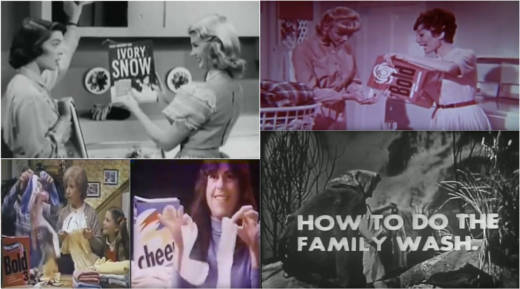In the 1950s, one angle employed to encourage housewifery was to convince women that there was glamor to be found in drudgery. In this Ivory Snow commercial from the period, the home was a "castle," the housewife was a "storybook princess," and the laundry was "her trousseau" (which, according to dictionary.com, means "the clothes, household linen, and other belongings collected by a bride for her marriage").
Back then, for the women who weren't buying the princess angle, laundry was presented as a complex and scientific task, well-suited to glasses-wearing, pointer-wielding smartypants who knew all about "cycletron programming" and "complete agitation." These Tide and Westinghouse commercials were transparently geared towards women who had ambitions beyond staying at home, to try and make it seem like doing so was actually a challenging, interesting, and science-y endeavor.
https://www.youtube.com/watch?v=8u2BTjLte0k
By the 1960s, detergent commercials somehow got even worse, proudly and loudly plunging headfirst into the realms of mansplaining. Watch in horror as omnipotent man voices tell these grown women what to do with their skivvies.
https://www.youtube.com/watch?v=wPrSpihatgM
At some point in the middle of the '60s, some genius at Bold figured out that talking about laundry was as interminably boring as doing it, and figured some music might liven things up. It absolutely did not, thanks to the fact that no one could be bothered to make up a song with a perceivable hook. Just check out Mrs. Smith and Mrs. Jones sing-speaking at each other like two malfunctioning Stepford Wives.
Fab managed to come up with a catchier jingle to accompany the 1968 ad below, while making it abundantly clear that fun in fields was the realm of boys, men, and "Jenny," who was "just as bad as the boys," and inside not-fun was for responsible ladies in clean dresses. The marked line between this sensible housewife and the rest of her fun family ends up being rather depressing. A matter made worse by the fact that, in 2010, the borax they're all so gleefully singing about was listed as a Substance of Very High Concern in Europe, due to the fact that it can cause infertility. Fun!
In the 1970s, in the midst of the second-wave feminism boom, Salvo had a panic attack about how to market itself. They put out one commercial that started with the line "Bet you miss your mommy now that she's working," and ends with the tagline "For women with lots to do!" The message is that women are allowed to have jobs now, but the laundry is definitely still one of them.
At least Salvo attempted to acknowledge the changing social status of women. Tide went into a deep denial and hammered home the message that things were just the same as they'd always been.
Most other companies, including Bonus, continued to present itself as a source of happiness for generations of women who were most fulfilled by staying at home.
That very specific idea of women passing down laundry to the next generation of girls continued well into the '80s (and beyond). This Bold ad featured three generations of women. Not a man in sight!
To give you some idea of how little sexist messaging changed in detergent commercials over the decades, here's one from the '80s, that is almost identical -- down to the borax jingle -- to the Fab commercial from 1968.
By the '90s, the idea that laundry was the exclusive domain of women was so ingrained in our culture -- as well as ad agencies' ideas of what would sell products -- that laundry commercials simply continued to run with the idea that professional work was for men and housework was for women. To put it in some context, this Gain commercial came out the same year that Netscape Navigator went on the market. So, at the same time the internet was becoming a viable at-home option, women in chore-related commercials were still eternally trapped there.
In the land of detergent, the most women could ask for was a New Man who appreciated their efforts, as seen in this Dash commercial from 1990.
As recently as 2007, Clorox told us in no uncertain terms that laundry was, and always has been a woman's job, adding that "maybe even a man or two" had done it at some point. Even if Clorox wished to cling to the idea that where there is a woman, there is a laundry-do-er, who did Clorox think had been washing the clothes of millions of single men, gay men, and male college students all that time?
In 2011, Clorox attempted to make up for that last one with a commercial featuring dads chatting on a playground and taking care of babies. Tellingly, we never actually see them interact with a washing machine though.
In 2013 -- 2013! -- Tide was still telling us that women were the ones to quit work "to be with the kids," and also that caring about laundry was something inherently passed down to women from their grandmothers. The messaging was 40-years old, and absurdly out of touch, yet apparently still no one could think of a better way to sell detergent.
Even just last year, Tide's Super Bowl ad "twist" consisted of NFL player Rob Gronkowski wearing pigtails and smelling bad -- but it was still a mom washing everyone's clothes.


